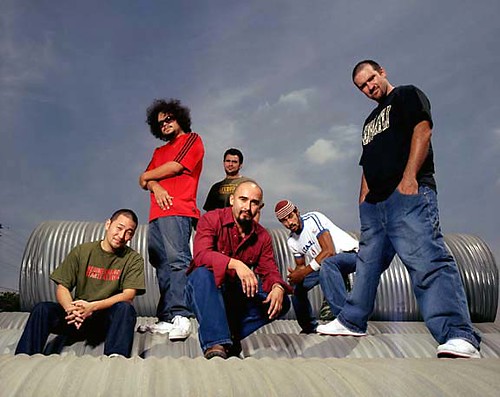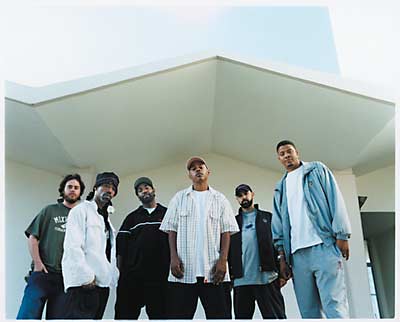July 31, 2005
The Billion-Dollar Myth
The 'Matrix' movies portray a frightening alternate reality. When a writer sued the movies' creators for stealing her ideas, she inadvertently exposed another reality--a racial one--that's no less troubling.
Sophia Stewart didn't attend her June 13 hearing at the U.S. federal court building in downtown Los Angeles. She saw the proceeding as a minor hurdle on the way to an anticipated July 12 trial in her copyright infringement suit against directors Andy and Larry Wachowski, James Cameron and other defendants—a trial she imagined would be "one of the largest suits for damages in the history of the film industry."
Her lawsuit claimed that the lucrative "Matrix" and "Terminator" film franchises were based on her ideas. Last month's request by the defendants to dismiss the case was an act of desperation, Stewart believed, because her proof of theft was indisputable. Stewart had attracted many supporters (mostly African American, who agreed that Hollywood had ripped her off) and detractors who question both the validity of her claims and her sanity ever since she began trying to rally support for her case in 2003. She claimed that she would have "big surprises" for the judge and jury, as well as for all of the naysayers, when her case finally went to trial.
Unfortunately, Judge Margaret Morrow wasn't interested in surprises. In her 53-page ruling, Morrow dismissed Stewart's case, noting that Stewart and her attorneys had not entered any evidence to bolster the key claims in her suit or demonstrated any striking similarity between her work and the accused directors' films. Stewart says she is hiring additional attorneys and is asking the court to reconsider that decision, but earlier this summer, in a nearly empty courtroom 790 of the Roybal Federal Building, Stewart's case apparently ended with a whimper.
But as in the "Matrix" movies, there's an alternate reality to this story that says a lot about the continuing racial divide between a mistrusting black America and the mainstream media. Stewart's courtroom defeat stands in bizarre contrast to what many of her fellow African Americans hold true, or want to believe happened as a result of her lawsuit.
In that alternate reality—created by Internet chain letters, radio stations and reputable community newspapers, and still flourishing on the World Wide Web—people sincerely believe that Stewart won her lawsuit last fall, and that she now is the wealthiest African American in the country, thanks to a record multibillion-dollar award. Her supposed settlement has been hailed as a legendary achievement in copyright infringement law, and a major moment in African American history. People also think that word of her victory has been suppressed as the result of one of the most sophisticated media conspiracies in history—even though none of that is true.
The Wachowski brothers' professional résumé was limited prior to "the Matrix"; they had written the screenplay for the lackluster 1995 Sylvester Stallone action film "Assassins," and in 1996 had made their directing debut with the low-budget noir crime flick "Bound." To hear Stewart tell it, that lack of experience suggests fraud.
"I'm the kind of master writer that comes once upon this Earth," Stewart says by phone from her Las Vegas home a week before the June 13 court hearing. "You don't go from [doing] a mediocre movie to a work of genius like 'The Matrix.' "
The Bronx, N.Y., native makes her living doing paralegal work and tax preparation. She is divorced and has two adult children, though she won't reveal her age, explaining that she doesn't believe in pagan rituals and refuses to celebrate holidays or birthdays. "It's all lies and illusions," she says. "We're timeless and ageless." She adds that her spiritual attitude forms the basis for the wise Oracle character in the "Matrix" films: "The Oracle is me. I wrote myself into my work."
In 1983, she says, she completed a science fiction tale titled "The Third Eye," which she copyrighted the following year. Stewart says the as-yet unpublished work—submitted as part of the fact-finding phase of her case—totals 120 pages, including a screen treatment, a 47-page version of the manuscript and a 29-page "original manuscript" with additional pages containing a synopsis, character analyses, illustrations and a table of contents. In 1986, she says, she saw an advertisement posted in a national magazine by the Wachowski brothers soliciting science fiction manuscripts to make into comic books and she sent them all of her materials for "The Third Eye," including a copy of her original manuscript. "My dream was to have my work seen as a movie and a comic book," she says.
Stewart says she never heard from the Wachowskis, and never had her materials returned. Morrow's ruling notes, however, that Stewart did not produce the ad as evidence. In denying that they ever placed such an ad, the Wachowskis said that, in 1986, Andy was just 18 and brother Larry was a 21-year-old college student.
Flash forward to the March 1999 theatrical release of "The Matrix." Stewart, then living in Salt Lake City, went with a friend to see the film. "I said to myself, 'I wrote this,' " she recalls, saying she recognized themes and characters from "The Third Eye" in the film. In June 1999, she says, she filed a written complaint with the FBI, charging that a copyright crime had taken place. In April 2003, acting as her own attorney, Stewart filed a lawsuit against a host of defendants, including the Wachowskis, "Terminator" director James Cameron, producers Gale Anne Hurd and Joel Silver, 20th Century Fox and Warner Bros., accusing them of copyright infringement and of violating Racketeer Influenced and Corrupt Organizations (RICO) laws, which were created in 1970 to combat organized criminal entities.
Not long after that, her story began to take a strange turn. Stewart produced and circulated a news release, trying to rally support for her copyright case by recounting her claims and request for damages. The mainstream media response was tepid, at best. However, one newspaper did find her story quite interesting.
On Oct. 28, the Salt Lake Community College's Globe ran an article on its website with the audacious headline " 'Mother of the Matrix' Victorious." Written by a second-year communications student, the article was among the first on the Web to reveal aspects of Stewart's story. Unfortunately, it also was rife with errors, stating among other things that Stewart had won her case (she hadn't) and that she was about to receive one of the biggest payoffs in Hollywood history (she wasn't). The story also questioned why the case had received no media coverage, and quoted Stewart's claim on a website that Warner Bros. had been suppressing coverage of her case for years because AOL Time Warner "owns 95 percent of the media … They are not going to report on themselves." Among the publications and businesses she claimed the company owned: the New York Times, the Los Angeles Times, Newsweek magazine and DreamWorks. In fact, AOL Time Warner doesn't own any of them.
It didn't take long for some mistakes to get the attention of Quentin Wells, the manager of the SLCC Student Media Center, which produces the Globe. "My son, who is a copyright attorney, read the article and said, 'This can't be right,' " Wells says. After approaching Stewart and checking the information in the piece, Wells discovered that Stewart's supposed "victory" was nothing more than a successful defense against an early motion to have her case dismissed. "It was an error [by] the writer," says Wells. "She had misinterpreted what Stewart had said."
Within a week, the Globe added a correction, but at the end of the Web version of the story. Yet a few weeks later, Wells noticed that the Globe website's server traffic had exploded from 14,500 hits a month to more than 640,000. "I contacted our [Internet] provider and told him that his counter must be broken."
It wasn't, and almost all of the new traffic was linking to the Sophia Stewart story. Also, in the brief time that the Globe story was uncorrected on the website, it had been copied and circulated around the Internet through mailing lists. Several Internet blogs then had linked to the story, bringing a steady stream of visitors to the site. The mythos of Stewart's victory continued to grow despite the correction.
The Globe ran a follow-up story this January, which continued to stoke conspiracy beliefs by stating as fact Stewart's assertion that "Warner Bros. and the other defendants in the case have also sought, with almost complete success, to prevent any publicity regarding the suit from appearing in any national or even local media. The result has been an almost total news blackout about the matter."
Soon, both Globe articles were reappearing almost verbatim on news websites such as Manhunt.com and continuing to make the rounds on mailing lists, sometimes with new bylines. Unlike the original stories, these reprints never included the correction stating that Stewart hadn't won her case. Radio hosts and callers on radio stations such as Hot 97 in New York City and KPFA's Hard Knock Radio in Berkeley also were discussing the Stewart case. The story began to appear in African American community newspapers such as the Westside Gazette in Fort Lauderdale, Fla., and the Columbus Times in Georgia. Most of those articles echoed the bad information in the original Globe piece. By April, a vast number of African Americans had read or heard some erroneous version of the Sophia Stewart story.
Such mistakes have long proliferated in American ethnic communities, but the Internet has added to their speed and potency. When the athletic footwear rage of the 1980s led to violence and deaths among urban kids, rumors surfaced in the African American community that one major manufacturer was owned by South Africans, and its profits were being used to support apartheid. After a particular brand of Mexican beer got a foothold in the U.S. market in the 1980s, rumors that Mexican workers were urinating in it were rampant in the western U.S. In her 1994 book "I Heard It Through the Grapevine: Rumor in African-American Culture," UC Davis professor Patricia Turner explains that the symbolic quality of some stories often is more important to certain groups than whether those stories are true. Stewart's story seemed particularly credible because she is a real person who filed a real case. "Sophia Stewart is David against Goliath," says Turner, and she represents African Americans who have been victimized by corporations.
Still, the tide is slowly turning. Essence, a million-subscriber magazine aimed at an African American audience, had never published a story on Sophia Stewart. But in its May issue it asked readers to hold off on repeating claims of Stewart's victory, and it pointed out that the case was not scheduled for trial until July. Some Internet chatter in recent months has become less sympathetic toward Stewart and her claims, with one fellow writer claiming "my loony detector alarms started going off" as he read more about her case.
That hasn't stopped columnists at many African American newspapers and news sites from continuing to speculate. Manhunt.com content manager Tamara Harris said the erroneous version of Stewart's story is appealing because it "vindicates all of the black artists going through this."
Not everyone believed the rumors. "The first time I saw it, I dismissed it," says Nnedi Okorafor-Mbachu, a technology columnist at the Star, a 60,000-circulation daily that serves Chicago's largely black southern suburbs. "But then, even though it sounded unbelievable to me at first, I didn't want to completely discount it until I saw evidence that it wasn't true."
Despite the wealth of misinformation circulating on the Internet, finding out the status of the case is as easy as making a telephone call. Stewart makes herself available to answer media questions, and a website called http://www.Daghettotymz.com lists her contact information and offers downloadable files of court documents. The site is the first hit when Stewart's name is Googled.
Yet Bobby Henry Sr., publisher of the Westside Gazette in Florida, remained confused recently when told about the case's status. "She didn't win?" Henry asked. "I'm shocked, because her having already won is all out there. It was even on the Tom Joyner [radio] show that she won." Representatives of the nationally syndicated Joyner program say they haven't written about Stewart on the show's site, and couldn't pinpoint when or if Stewart was mentioned on the air.
Dr. Todd Boyd, professor of critical studies at USC's School of Cinema-Television, says the Stewart case speaks to African Americans' deep distrust of the media. "A lot of people, regardless of race, continue to have very unsophisticated views of the media," said Boyd. "And many African Americans in particular are still very distrustful of the media." That distrust comes from a history of being either negatively portrayed or completely ignored by the press.
Bruce Isaacs of Wyman & Isaacs, the attorney representing the defendants in the Stewart case, says a media conspiracy is not the reason the case has seen little coverage. "The question shouldn't be why hasn't the media covered this case, it should be why would the media cover this case?" says Isaacs. "It's a run-of-the-mill copyright case, and I think the judge clearly addressed the case's merits in her ruling."
As for Stewart, she still believes that AOL Time Warner is suppressing her struggle—"Why am I not on 'Larry King Live' or 'Oprah'? " she wonders—and remains determined to make the rumor into a reality. After the judge dismissed the case, Stewart was upbeat. If Morrow won't reconsider her decision, Stewart says she will appeal the judge's decision to the U.S. 9th Circuit Court of Appeals and to the Supreme Court, if necessary. "And they'll rule in my favor," says Stewart. "So tell everybody that it's not over until the fat lady sings, and she hasn't sung yet."



